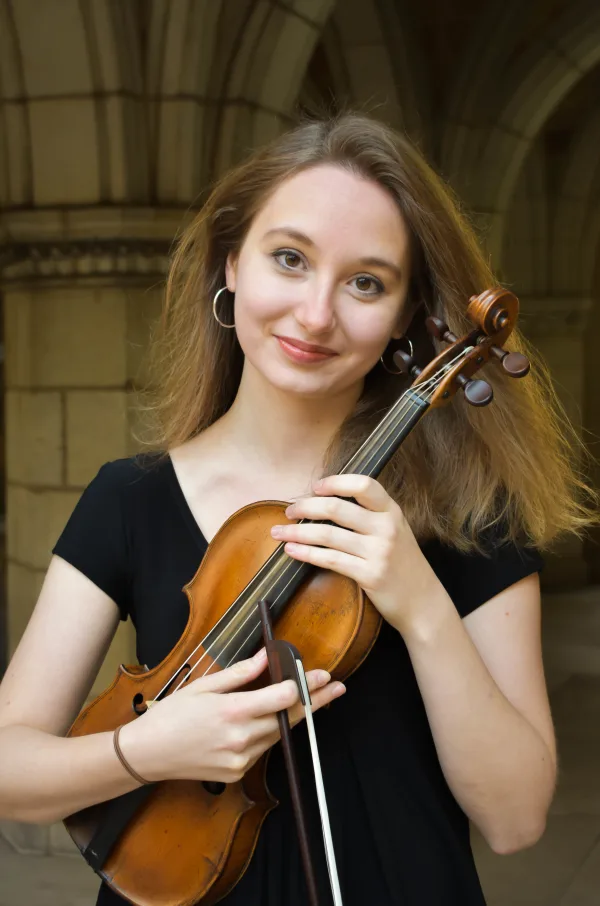About
Vivian Mayers was educated at the Juilliard School and Yale University. She is a passionate teacher and performer, specializing in both modern and historical styles of playing. Vivian is certified in Level One of the Suzuki violin method, and also incorporated many elements of traditional pedagogy into her teaching. She believes that music education should target all aspects of a student's development, including the personal, social, and intellectual. Vivian loves to cook and hike in her free time!
Highlights
Photos and videos

Reviews
Peter S.
Anatolii P.
Frequently asked questions
What is your typical process for working with a new student?
If a student has never taken music lessons before, I will start by introducing some basic musical concepts with interactive games. Otherwise, I typically ask a student to play something they feel confident with. We'll work together on a variety of different things, from technique to rhythm to expression, so I can get a sense of the methods that work best for the student. After that, I will assign pieces and technical exercises at a rate that is both manageable and challenging for the student. We'll work together to decide what your goals are!
What education and/or training do you have that relates to your work?
I have completed and in-progress degrees from the Juilliard School and Yale University. I am a certified Level One Suzuki instructor in violin. I have five years of experience teaching private lessons to students from five to fifty years old.
Do you have a standard pricing system for your lessons? If so, please share the details here.
I charge $70 per hour. Lessons can be either 30, 60, or 90 minutes long, depending on the student's age and level of commitment. Once a student starts working with me, they are committing to one lesson per week.
If a student cancels a lesson within 24 hours of when it is scheduled, or if the student does not attend a scheduled lesson at all, they will still be charged for the session. Late arrivals will not be given extra time at the end of the lesson, and the full payment for the scheduled time slot is still expected. If I am more than five minutes late for a lesson, the charge will be decreased accordingly.
How did you get started teaching?
I started teaching in high school, when my orchestra teacher asked me to coach other students outside of class. I found that helping students improve their musical abilities is incredibly fulfilling for me, so I decided to take a Suzuki pedagogy training course and have sought out students of many ages since then.
What types of students have you worked with?
I have worked with students ranging from kindergartners to seniors, from absolute beginners to conservatory-level players. Every student presents different challenges and opportunities, and I love working with a wide range of people to figure out the best pedagogical methods for them as individuals.
Describe a recent event you are fond of.
One of the ideas I always try to instill in my students is that technical skill is just a way to express yourself musically, not an end in itself. In other words, being able to play in tune is great, but it doesn't mean anything unless it helps you produce a beautiful, expressive sound. One of my adult students recently mastered a Boeing technique that allowed him to play the end of a piece in a gorgeous, heartfelt way. He said to me, "I'm so glad I learned how to do that! Now I feel like I can really say something with my bow."
What advice would you give a student looking to hire a teacher in your area of expertise?
The most important thing to look for in a teacher is someone who is willing to meet you where you are. Music lessons should be fun and enriching, not stressful or unpleasant. Your teacher should be committed to helping you achieve your goals, but shouldn't pressure you to commit more or less than you want to. Whether you become a professional violinist or just someone who plays for fun, your musical education is just as important. Find a teacher who recognizes that and is eager to support you on your musical journey!
What questions should students think through before talking to teachers about their needs?
It is always good to have a goal in mind when you start taking music lessons. This could be anything from playing a scale to performing a recital to getting into a music school, but your teacher needs to know what you're aiming for. If you don't know what your goals are yet, your teacher can help you figure that out!
It's also good to know whether you have access to an instrument. If you don't already have one, you should have a price range in mind so that your teacher can help you look in the right places.
You should also communicate to your teacher how much time you'd like to spend practicing every day. You can make a lot of progress whether you practice for fifteen minutes or two hours per day, so this is up to you. Your teacher will adjust their goals for you depending on how much time you have, though.